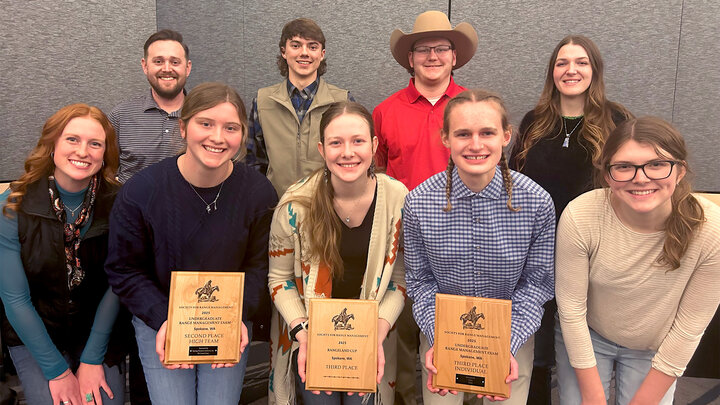The University of Nebraska–Lincoln placed runner-up in the Undergraduate Range Management Exam competition and third in the Rangeland Cup at the Society for Range Management’s annual meeting Feb. 10 in Spokane, Washington.
The hour-long URME featured multiple-choice questions across six categories — Range Ecology, Grazing Management, Range Improvement, Range Regions, Range Inventory and Analysis, and Multiple-Use Relationships. Students also faced problems in grazing management, range improvements and inventory analysis.
“We’re incredibly proud of this hardworking, talented group of students,” URME coach Aisha Sams said. “Their wins at SRM are just the beginning, and we can’t wait to see all they accomplish in the future.”
The team members were Joseph Barenberg, Clara Freese, Cassidy Maricle, Sam Morrow, and Sheridan Wilson, all of whom are grassland systems majors; Bobbi Guggenmos, who is majoring in agricultural leadership, education, and communication; and Abby Hirschman, an animal science major. Two students from Nebraska finished in the top 10 individually — Freese, who secured third place, and Wilson, who took ninth place.
“The URME covers a wide variety of topics in range management, such as range ecology, grazing management, range regions, and calculating stocking rates and biodiversity. It’s a great way to assess your understanding of broad, range management principles,” Freese said.
“I did not expect to do as well on this exam as I did, so getting third place individually was quite exciting,” she said.
The Rangeland Cup is a collegiate, team-based competition that fosters critical thinking on important and historically significant topics in rangeland ecology and management. It includes a research poster presentation where students receive a range science-related prompt and are tasked with finding potential solutions.
This year’s prompt was to design a threats-based management plan for an Intermountain West landscape between 800,000 and 2 million acres. The plan would include core sagebrush, growth opportunity areas, and other rangeland areas. The plan would use the Sagebrush Conservation Design and classroom and on-range experiences. The Nebraska Rangeland Cup team of Guggenmos, Morrow and Freese placed third out of 15 teams.
“Our plan aimed to collaboratively manage for heterogeneity to maintain and restore a core sagebrush landscape that supports biodiversity and overall ecological function of the region,” Freese said.
Their plan worked through a five-step process — strategizing, forming advisory committees, creating management actions and units, determining effectiveness and annually reviewing and updating.
“The threats we addressed with our management plan included invasive species, altered fire regimes, land use change, climate resiliency and wildlife/habitat fragmentation,” Morrow said. “Our main management action was to reintroduce the historic fire return interval by dividing our landscape into 100 management units. Other management actions suggested in our plan included targeted herbicide application and prescribed grazing.”
In addition to competing in various contests, such as Plant ID, during the SRM annual meeting, students networked with professionals and attended sessions and keynote speakers. Twenty-three universities and approximately 120 students from North America participated.
The Department of Agronomy and Horticulture’s coaches are Sams, a research technologist who instructs the URME team; Cheryl Dunn, a lecturer and Herbarium Curator who leads the Plant ID team; and Nicholas “Nic” McMillan, an assistant professor in range and forage sciences who guides the Rangeland Cup team.




